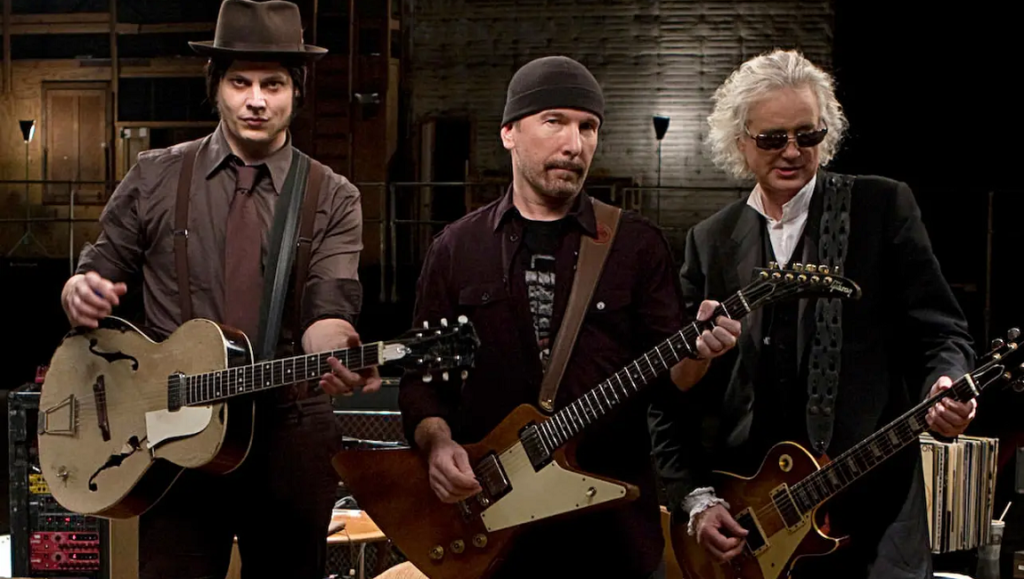A VH1 programmer’s (wet) dream come true, It Might Get Loud assembles three generations of guitar gods under one roof, where they’ll talk shop, swap war stories, and maybe even make a little noise together. The marquee reads like the lineup to a sold-out charity benefit. There’s Jimmy Page, aged axeman of the seminal guitar rock group, Led Zeppelin. There’s The Edge, whose reverb-drenched soundscapes helped propel U2 to worldwide superstardom. And rounding out the trifecta is Jack White, our preeminent arena-rock minimalist, frontman of unlikely multi-platinum two-piece The White Stripes and boys club side-project The Raconteurs. On his way to meet his rock n’ roll elders, Jack predicts a fistfight. He’s either playing dumb or in for a letdown. This is a rock-doc so polite you could blare it from your bedroom and not hear a peep from your dad about turning the damn thing down. A movie like this should course with the kind of messy, stoopid amplifier worship that Jack Black so joyfully transmitted in School of Rock. Instead, it feels calculated in its dewy-eyed reverence. Remember, feedback is in again (thanks, Guitar Hero!), and this super-sized Storytellers episode milks that old-is-new fanfare for all its cheap-seat dollar value.
Anyone who rolled their eyes through the moody interludes of An Inconvenient Truth — you know, all those “arty” passages wherein Al Gore wasn’t lecturing about global warming — will recognize the heavy hand of director David Guggenheim. He busts some familiar moves here (lots of pensive staring out of car windows), but it’s the moments alone with his swinging dick attractions that prove, by default, the most compelling. The tight-lipped Page doesn’t make for much of an interview subject. A living legend resting comfortably on his laurels, he acts as tour guide through a couple of famous haunts, but offers few inside stories about his time with Zeppelin or The Yardbirds. Nor does he go much into the “process” of how he crafted those indelible riffs. (Alas, no discussion of his Puff Daddy collaboration either.) The Edge is much more talkative and candid, going so far as plainly demonstrating how completely his signature, ethereal guitar sound is a product of studio manipulation. Too bad he’s not particularly charismatic — Guggenheim keeps cutting to U2 concert footage, as if to remind us that this soft-spoken, kind of dull Irishman really is laying down licks for the biggest band in the world. It’s Jack White who carries the burden of interest here, largely because he’s the most in touch with his inner asshole. White records an impromptu jam for the camera, dresses like a wannabe blues man from the 1920s, and kicks it with a child actor done up just like him, Mini Me style. He’s prone to grandiose statements, to speaking in chortle-worthy, rock-purist absolutes. But he also spins a few mean yarns, waxing nostalgic about his childhood in Detroit. (According to White, playing guitar was actually, at the time, painfully uncool.) He makes for a fascinating subject — can’t wait for that White Stripes tour-of-Canada doc — and Guggenheim positions his old-fashioned convictions about recording/performing in direct opposition to The Edge’s full-on embrace of effects pedals. (Jack builds a guitar out of spare parts, while The Edge proudly demonstrates the plinking, tuneless simplicity of one of his iconic riffs, unplugged and unaltered.)
Bouncing these radically different artistic perspectives off one another, the film appears to be building to some kind of analog/digital showdown between the two giants. If only. The actual meeting of the minds, the rendezvous at the film’s center, is too damn well-mannered to be of much interest. Like visiting dignitaries from the Rock N’ Roll Hall of Fame, each guitarist takes a turn gabbing, while the other two nod politely at the talk show talking points. Instead of trading secrets, they fawn together over shared musical obsessions. (Gee, what a shocker: they all dig the blues.) This ho-hum round-table would have been more forgivable had the film’s inevitable jam session amounted to more than just a classic rock circle jerk. Hey guys, how about trying each other’s songs on for size? Imagine what White could do with “Sunday Bloody Sunday,” or what “Ball and Biscuit” would sound like with Jimmy Page adding his own firepower to the mix. These virtuosos shred and pluck and noodle their way to an inconvenient truth: the quickest way to kill a rock star’s cool is to lionize it.


Comments are closed.